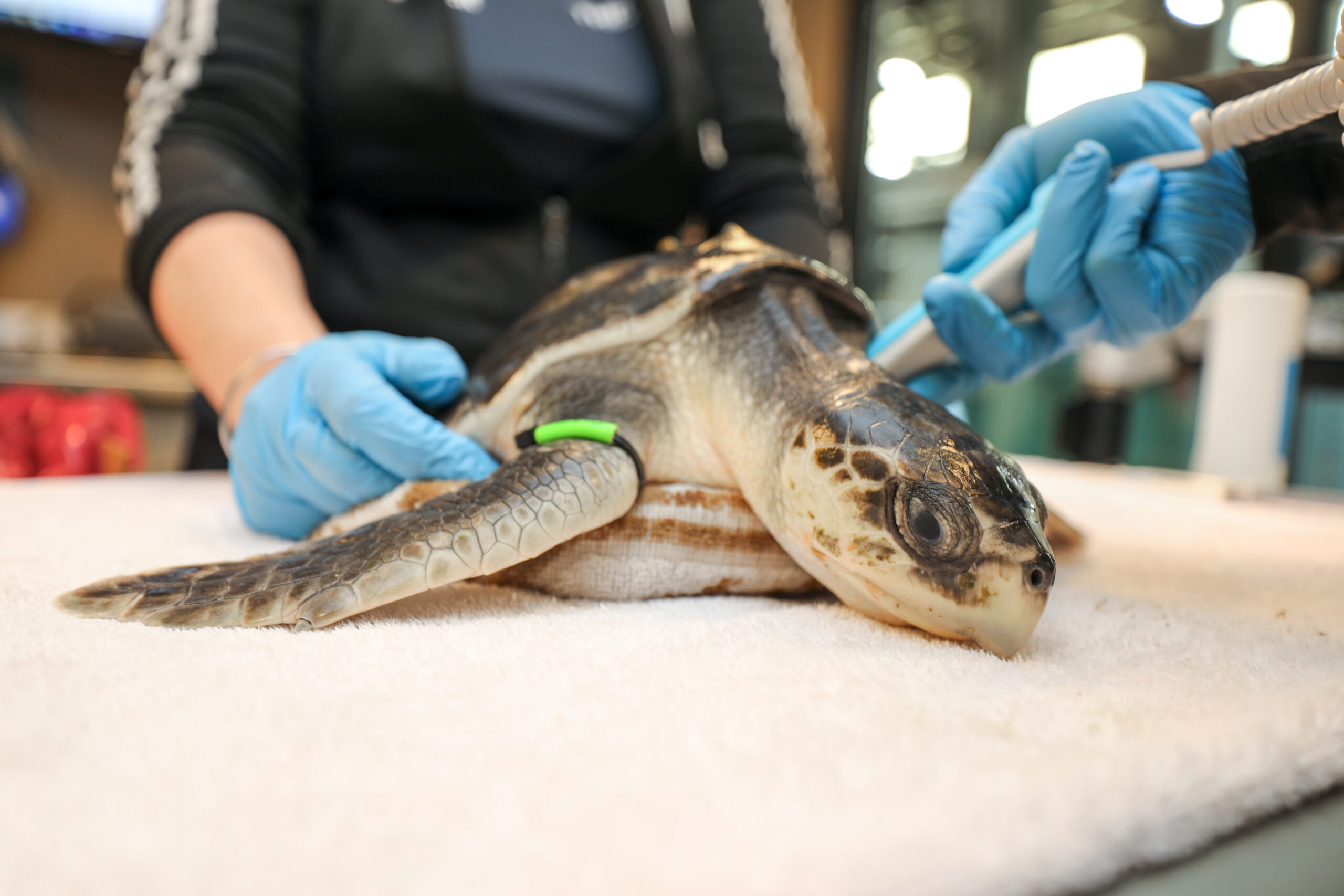
QUINCY, MASS. (Dec. 4, 2023) – As the annual sea turtle stranding season ramps up, the New England Aquarium is treating a large number of hypothermic or cold-stunned sea turtles that have washed onto Massachusetts shores in critical condition.
**PHOTOS AND VIDEO AVAILABLE HERE, WITH CREDIT TO NEW ENGLAND AQUARIUM**
The turtles began to strand on Cape Cod in early November. Staff and volunteers from Massachusetts Audubon Wellfleet Bay Wildlife Sanctuary have been walking the beaches along Cape Cod Bay in search of cold-stunned turtles and transporting the animals to the Aquarium’s Sea Turtle Hospital in Quincy, MA, where they are treated for life-threatening medical conditions resulting from hypothermia and the inability to feed.
So far this season, Aquarium staffers have treated 214 sea turtles: 189 critically endangered Kemp’s ridley turtles, 19 green turtles, and six loggerheads. In an unusual occurrence, five cold-stunned sea turtles have washed ashore in Hull and Hingham this season, which could indicate that more turtles in Massachusetts Bay are inhabiting a wider range of locations.
“This sea turtle stranding season has gotten off to a later start than the past few years. We are ramping up now and have seen 134 turtles in just the past five days. Whether it is 1 or 100 turtles in a given day, our team at the New England Aquarium is ready to help give these turtles the best shot of being returned home,” said Adam Kennedy, the Aquarium’s Director of Rescue and Rehabilitation.
When a sea turtle arrives at the Aquarium’s Sea Turtle Hospital, staff evaluate the rescued turtle by performing a thorough physical exam, bloodwork, and X-rays. Many of the animals suffer from dehydration, pneumonia, and various injuries such as fractures of their shells, and may need weeks, months, and sometimes more than a year of treatment before they can be released back into the ocean.
“These turtles are often critically ill and require a variety of medical treatments to ensure they have the best chance for survival,” said Senior Veterinarian Dr. Kathryn Tuxbury.
Each fall and early winter, hundreds of cold-stunned sea turtles wash up on the beaches of Cape Cod. Because of the rapidly changing water temperature and wind pattern, many turtles cannot escape the hook-like area of Cape Cod Bay before becoming hypothermic. As the Aquarium’s Sea Turtle Hospital reaches full capacity, the team works closely with the National Oceanic and Atmospheric Administration’s (NOAA) Fisheries Service, the non-profit organization Turtles Fly Too, and other partner organizations to help transport and rehabilitate the animals.
To make room for new arrivals at the Sea Turtle Hospital, some stabilized turtles are transported to secondary rehabilitation facilities, where they continue care before being released into the ocean. Volunteer pilots with Turtles Fly Too began transport flights last week, flying 35 turtles from the New England Aquarium to North Carolina Aquarium at Pine Knoll Shores and Karen Beasley Sea Turtle Rescue and Rehabilitation Center. Another 15 turtles made their way to National Aquarium by ground transport last week. Other more critical turtles remain at the New England Aquarium, where many will complete their full rehabilitation process before being released back into the ocean in the spring and summer months.
MEDIA CONTACT: Pam Bechtold Snyder, psnyder@neaq.org; 617-686-5068
